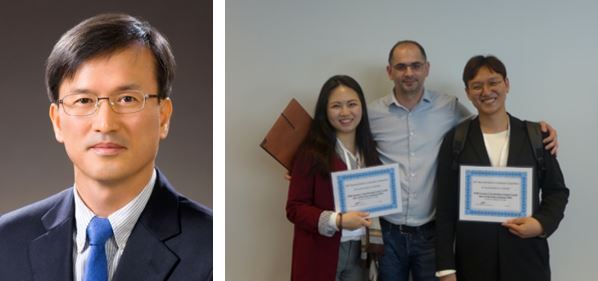- About
- Academics
-
Undergraduate Programs
- Civil and Environmental Engineering
- Architecture and Architectural Engineering
- Mechanical Engineering
- Industrial Engineering
- Energy Resources Engineering
- Nuclear Engineering
- Materials Science and Engineering
- Electrical and Computer Engineering
- Naval Architecture and Ocean Engineering
- Computer Science and Engineering
- Aerospace Engineering
- Chemical and Biological Engineering
-
Graduate Programs
- Civil and Environmental Engineering
- Architecture and Architectural Engineering
- Mechanical Engineering
- Industrial Engineering
- Energy Systems Engineering
- Materials Science and Engineering
- Electrical and Computer Engineering
- Naval Architecture and Ocean Engineering
- Computer Science and Engineering
- Chemical and Biological Engineering
- Aerospace Engineering
- Interdisciplinary Program in Technology, Management, Economics and Policy
- Interdisciplinary Program in Urban Design
- Interdisciplinary Program in Bioengineering
- Interdisciplinary Program in Artificial Intelligence
- Interdisciplinary Program in Intelligent Space and Aerospace Systems
- Chemical Convergence for Energy and Environment Major
- Multiscale Mechanics Design Major
- Hybrid Materials Major
- Double Major Program
- Open Programs
-
Undergraduate Programs
- Research
- Campus Life
- Communication
- Prospective Students
- International Office
Research team of Prof. Changook Park of Department of Mechanical & Aerospace Engineering was placed in second in 2017 Microsoft Indoor Localization Competition.
-
Uploaded by
관리자
-
Upload Date
2017.09.19
-
Views
629
Research team of Prof. Changook Park of Department of Mechanical & Aerospace Engineering was placed in second in 2017 Microsoft Indoor Localization Competition.

▲ Research team of Prof. Changook Park of Department of Mechanical & Aerospace Engineering : (From the left) Prof. Park, Ph.D. candidate Hojin Joo , Ph.D. candidate Soyoung Park.

▲ The first division result of 2017 Microsoft Indoor Localization Competition
▲ Research team of Prof. Changook Park of Department of Mechanical & Aerospace Engineering : (From the left) Prof. Park, Ph.D. candidate Hojin Joo , Ph.D. candidate Soyoung Park.

▲ The first division result of 2017 Microsoft Indoor Localization Competition
Seoul National University, College of Engineering(Dean Kunwoo Lee) announced that a research team of Prof. Changook Park of Department of Mechanical & Aerospace Engineering was placed in second in the first division of Microsoft Indoor Localization Competition which was held in the United States, Pittsburgh on April 18th to April 19th.
The competition of indoor localization is the fourth competition after competitions in Berlin, Germany in 2014, Seattle in 2015 and Vienna in Austria in 2016. This year, the host members of the competition are Microsoft, Google, Intel, Bosch, Carnegie Mellon University and Oxford University and the competition was supported by Microsoft and Bosch. A total 18 teams competed in the first division (two-dimensional positioning) and the second division (three-dimensional positioning) in this contest. The participants were from 14 nations (Israel, USA, Portugal, Korea, Canada, Taiwan, Japan, China, Saudi Arabia The UK, India, and Germany ). Each team used a variety of method, such as pedestrian navigation, Wi-Fi, Radar, beacon, UWB, infrared, etc., to construct the experimental environment on the first day and then asked to confirm certain locations on the second day. Only one chance was given to each team.
The first division which the research team of Prof. Park participated requires measuring 2-dimensional location without additional infrastructure. On this year’s competition, a mission was walk freely 200m for 10 minutes while going up and down the stairs of third and fourth floors of the David Lawrence Convention center.
The research team developed a real-time gait navigation system using only gyroscopes and acceleration sensors attached to shoes and calves, making it the second most misplaced position accuracy (2.415m) among the nine teams in the first division. There was the only 18cm discrepancy from a team from the McMaster University in Canada.
Pedestrian navigation, which is performed indoors, is a very challenging technology all over the world since it cannot use GPS. Therefore, in order to estimate location in a building, a variety of materials such as building an indoor map, Wi-Fi AP, and camera are used. The Navigation and Electronic System Laboratory of Seoul National University especially utilized the gyro and accelerometers attached to shoes and calves, and they achieved excellent performance by accurately measuring the speed of user when walking.
The technology obtained by the Laboratory through this competition does not require prior information and also does not rely on the building structure. Moreover, it has a great portability. Therefore, the technology can be used in a variety of fields such as fire suppression, simulated military training in virtual reality, large indoor shopping malls which have a lot of obstacles and so on. It is expected that it will be useful for many fields where people need a position information.
Meanwhile, the Navigation and Electronic System Laboratory under the supervision of Prof. Changook Park consists of Ph.D. candidate Hojin Joo and Ph.D. candidate Soyoung Park. The laboratory has been actively conducting research on the lunar rover, terrain reference navigation, GPS-INS navigating system, image-based target recognition and pedestrian navigation using gyroscopes and acceleration sensors of a various price range. Furthermore, in 2015 and 2016, they won in the IEEE indoor navigation competition (IPIN).